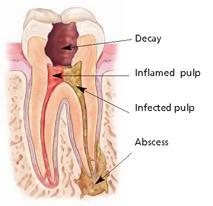Service Specialties
 Our office is equipped with digital radiography, which helps us visually communicate to patients. The large image on the monitor enables us to show patients areas of concern and help educate them regarding their treatment. My most valuable tool is the microscope. The increased magnification and light helps me provide the very best endodontic care, such as conventional root canal therapy, retreatment, surgery, perforation repairs, and finding calcified or missed canals.
Our office is equipped with digital radiography, which helps us visually communicate to patients. The large image on the monitor enables us to show patients areas of concern and help educate them regarding their treatment. My most valuable tool is the microscope. The increased magnification and light helps me provide the very best endodontic care, such as conventional root canal therapy, retreatment, surgery, perforation repairs, and finding calcified or missed canals.
As you know the fear of dentistry is so common that most individuals tend to avoid dental treatment. Of all the procedures in dentistry, root canals are probably the least favored. Being aware of these concerns during my training, I received a license to provide intravenous conscious sedation. Phobic and anxious patients who utilize IV sedation have no recollection of the procedure. Oral sedation and nitrous oxide are also available for patients. In addition, our ceiling-mounted televisions allow patients to watch their favorite channels during treatment. By keeping the patient comfortable, I can dispel the negative rumors of root canals, one patient at a time.
Please feel free to contact my office at 858-866-0696 if you desire the highest quality of care for comprehensive and personalized endodontic treatment.
Root Canal Treatment
When the inside of a tooth (the pulp) becomes inflamed or infected endodontic treatment is necessary. When the pulp is damaged, the only alternative to endodontic treatment is the extraction of the tooth. After the tooth is numb, the pulp is removed from the canals and the canals are filled with a rubber-like material called gutta-percha. After the root canal is completed, the patient must return to their dentist to have a filling and/or crown placed. This seals the gutta-percha from oral bacteria and protects the tooth from breaking.
When inflammation or infection persists around the end of a root canal treated tooth, usually the root canal can be retreated. Occasionally, an apicoectomy might be necessary. An apicoectomy is a surgical procedure which requires an incision in the gum tissue to expose the infection at the end of the tooth. After the infection and a portion of the tooth is removed, a small filling is used to seal the end of the tooth.
If a tooth is extracted, sometimes the empty space can be replaced with an implant or bridge. However, no matter how effective modern tooth replacements are, nothing is as good as a natural tooth.
Sedation Dentistry Options
Nitrous Oxide helps patients manage the fear and anxiety related to the dental experience. The amount of nitrous oxide is adjusted until a desired level of sedation is seen. Patients do not need a escort if nitrous oxide is the only sedative used. There is a small fee associated with nitrous oxide.
Oral Sedation involves taking a pill 30-45 minutes before the appointment to help manage fear and anxiety. Oral sedation can not be adjusted, making it difficult to adjust the level of sedation. An escort is necessary when using oral sedation. Our office does not charge an extra fee when using oral sedation alone. Oral sedation is frequently combined with Nitrous Oxide.
Intravenous Sedation (IV Sedation) has a rapid onset of sedation, allowing the drug dosage to be adjusted to the specific needs of the patient. There if very little, if any, recollection of experiencing endodontic treatment when utilizing IV sedation. This amnesia is a major advantage for patients exhibiting pronounced levels of apprehension and fear. An escort is necessary, and an IV sedation fee is added to the procedure. Patients will need an examination before the IV sedation to review the health history.
